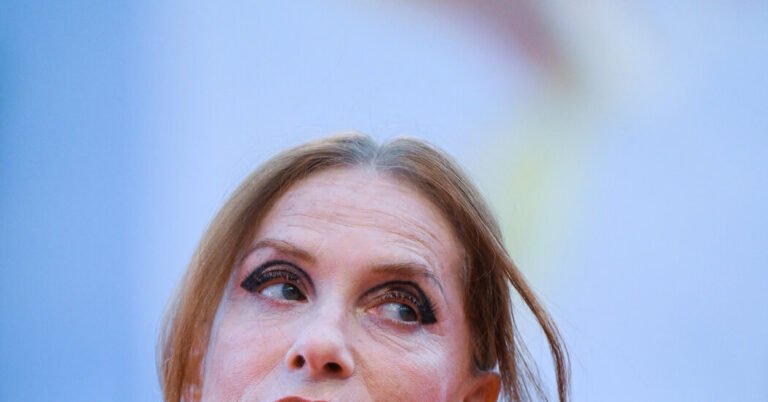
Actors often have more than one project on the boil. The French actress Isabelle Huppert takes multitasking to the next level.
For the next 11 days (Wednesday through Sept. 7), Huppert is heading up the jury of the Venice Film Festival, watching nearly two dozen movies (together with the other jurors) and handing out awards, including the coveted Golden Lion.
In the days and weeks leading up to the festival, Huppert has been working nonstop.
Earlier this week, for two nights in a row, Huppert performed alone onstage at the Ruhrtriennale festival of the arts in Germany, delivering the 100-minute monologue “Bérénice” (an adaptation by Romeo Castellucci of the 17th-century French tragedy by Jean Racine).
Days before that, she was on a film set in Belgium, playing a fictionalized version of Liliane Bettencourt — the billionaire heiress to the L’Oreal cosmetics fortune — in “La Femme la plus riche du monde” (“The World’s Richest Woman”).
Huppert’s résumé is correspondingly impressive. She has more than 120 films to her name, as well as an Academy Award nomination (best actress in 2017 for “Elle”) and quite a few theater productions. She manages to toggle between film and stage acting, appearing regularly in cinemas and theaters around the world.
Fresh off the set in Belgium, and busy relearning her lines for “Bérénice,” Huppert discussed film festivals, the future of cinema and the American stage director Robert Wilson in a recent phone interview. This interview was conducted in French and has been edited and condensed.
You’re going to be the president of the Venice Film Festival jury. How important are film festivals to the movie industry as a whole?
Festivals are more and more important. We all know that with the development of new ways of watching movies such as streaming platforms — which do have their virtues — movie theaters are somewhat threatened. So festivals are crucial ecosystems for the visibility of movies and for the film industry as a whole.
They’re a rendezvous with cinema, where movies are screened in the best possible way, and they showcase different categories of films. To me, they’re instrumental.
What makes the Venice Film Festival so special is that it’s in a magical setting — Venice — which adds to the overall magic of the event.
Movie theaters are closing down all over the world, even big ones on the Avenue des Champs-Élysées in Paris. Isn’t that worrying?
Yes, but I would like to stay optimistic. My family and I look after two small art house movie theaters in Paris: the Christine and the Écoles. Paris remains a very privileged city in terms of movie theaters.
But we live in a world where the internet seems to have taken over so many different fields and where people are increasingly staying home to watch movies on streaming platforms.
I believe people will still have a passion for going to the movies. One can sometimes ask oneself whether cinema is an everlasting art form and whether people will continue to go to the movies. My inclination would be to say yes.
You played yourself in a series, “Call My Agent!,” for one of the streaming services.
That was one episode of a series. Like many other French actors, I participated in that series. Otherwise, I don’t do series.
Series are a different way of watching and of telling stories, a different kind of narration. They’re not the same thing as cinema. Cinema is more individual: It’s a perspective on the world. A movie consists of a person giving us their vision of the world, their point of view.
You very successfully manage a career between film and theater.
I’m very happy because there are not that many actors who do it as much as I do. I sound a little pretentious when I say that.
I’m very proud of what I do in the theater because I only work with particular directors, such as Romeo Castellucci, who’s directing “Bérénice,” Ivo van Hove and Robert Wilson.
I’ll soon be reappearing in Bob Wilson’s production of “Mary Said What She Said,” a monologue inspired by the letters of Mary, Queen of Scots.
How did you meet Bob Wilson?
The first time I came across him was at a festival in Iran, the Shiraz Arts Festival, in 1972. I was still barely more than an amateur at the time and happened to be passing through, performing in a fringe show. Then I saw Bob Wilson from a distance and saw one of his shows for the first time. Staged on a hill, it was called “KA MOUNTAIN AND GUARDenia TERRACE” and it lasted seven days and seven nights.
I met him much later through friends, and he asked me to perform “Orlando,” a monologue based on the Virginia Woolf novel. We have worked together ever since.
To me, Bob Wilson is a genius — someone who has changed our vision of theater. He’s much more than a stage director. He works with space, with light, with rhythm, with silence. Above all, he’s a poet. He creates a somewhat mysterious world. He works on prompting instant sensations rather than instant understanding.
You once quoted the filmmaker Jean-Luc Godard as saying, “It’s visible when she’s thinking.”
Yes. It was very flattering. Theater and film are the art of the present, the art of the instant. So you have to think a lot.
Do you mean thinking while you’re acting?
Yes, but mainly beforehand.
What do you think about when you’re performing?
I have a hard time answering that question. I don’t really know.
Because you’ve slipped into the skin of a character?
No, I don’t really believe in the notion of character. I always prefer to say that I play people rather than characters. To me, the word “character” means entering into a slightly arbitrary world. A character is someone who doesn’t exist. As actors, what we like to do is to bring people to life.